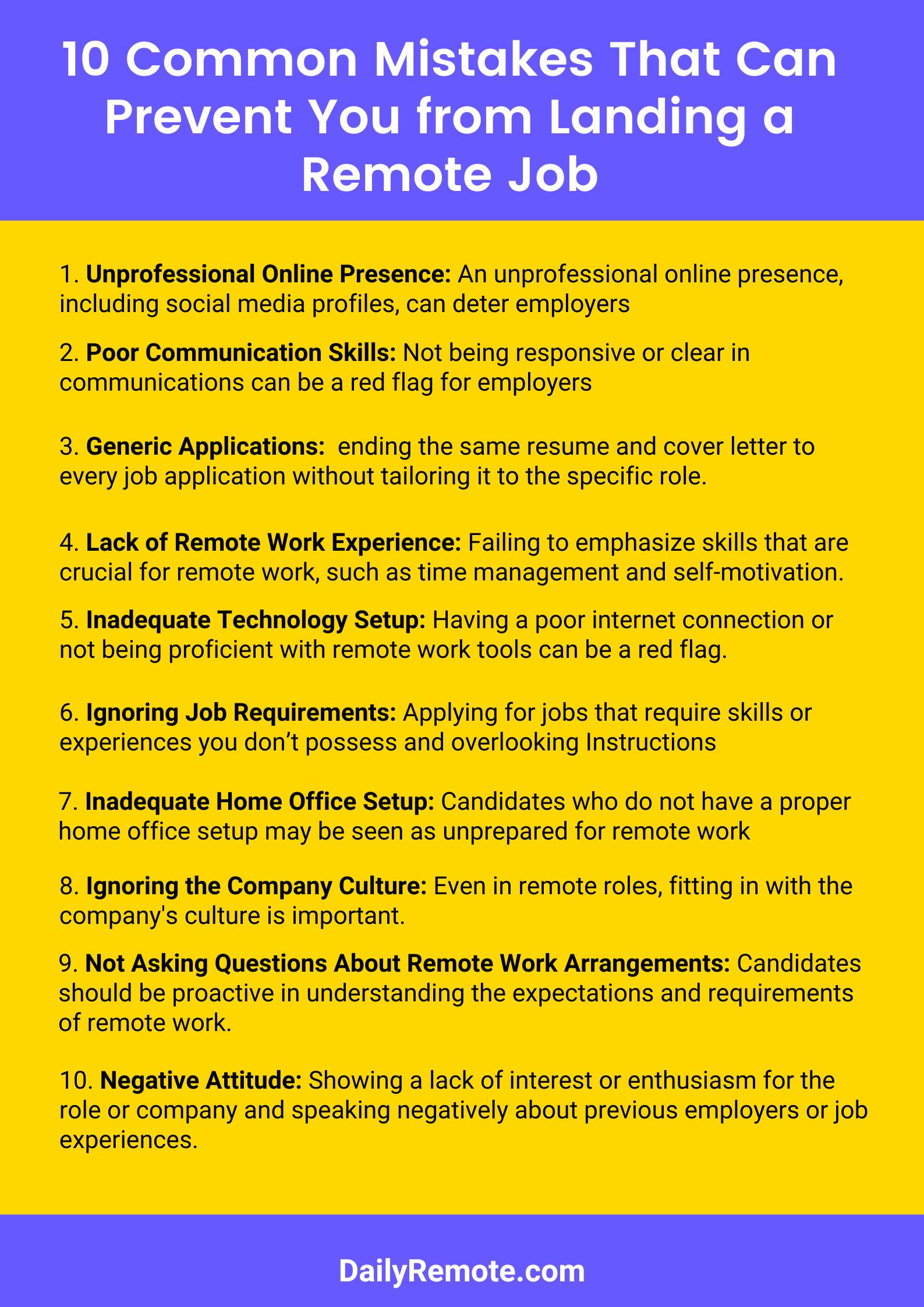According to online reviews and expert advice, one of the worst things a candidate can do that holds them back from getting remote jobs is failing to demonstrate their ability to work independently and manage their time effectively. Remote jobs require a high degree of self-motivation and discipline, as there is often less direct supervision than in-office roles.
In this blog, we'll explore the most common mistakes that candidates make when applying for remote positions. By understanding and avoiding these errors, you can enhance your application process, make a stronger impression on potential employers, and increase your likelihood of landing that coveted remote job. Whether you're new to remote work or looking to improve your job search strategy, these insights will help you navigate the remote job market more effectively.
10 Common Mistakes That Can Prevent You from Landing a Remote Job
Finding a remote job can be competitive, and certain missteps can significantly hinder your chances of landing a position. Here are ten things candidates often do that can hold them back from securing remote jobs:
1. Unprofessional Online Presence:
- Neglecting Social Media: Inappropriate posts or an unprofessional LinkedIn profile can deter potential employers.
- Incomplete Profiles: Failing to complete your LinkedIn or other professional profiles can make you seem less serious.
2. Generic Applications:
- One-Size-Fits-All Resumes: Sending the same resume and cover letter to every job application without tailoring it to the specific role.
- Lack of Personalization: Not addressing the hiring manager by name or failing to mention the company in your cover letter.
3. Poor Communication Skills:
- Unclear Emails: Sending poorly written or unclear emails to potential employers.
- Lack of Follow-Up: Failing to follow up after submitting an application or completing an interview.
4. Ignoring Job Requirements:
- Mismatched Skills: Applying for jobs that require skills or experiences you don’t possess.
- Overlooking Instructions: Failing to follow application instructions or ignoring specific requests from the employer.
5. Inadequate Technology Setup:
- Technical Issues: A poor internet connection or outdated technology can be a red flag for remote roles.
- Unfamiliarity with Tools: Not proficient with remote work tools like Slack, Zoom, or project management software.
6. Lack of Remote Work Experience:
- Not Highlighting Relevant Skills: Failing to emphasize skills crucial for remote work, such as time management and self-motivation.
- Ignoring Remote Experience: Not mentioning previous remote work experience or relevant projects.
7. Unprofessional Interview Environment:
- Distracting Backgrounds: Conducting video interviews in a noisy or cluttered environment.
- Inappropriate Attire: Dressing too casually for video interviews.
- Inadequate Home Office Setup: Candidates who do not have a proper home office setup may be seen as unprepared for remote work. This setup can include a quiet space, a reliable internet connection, and necessary equipment.
8. Poor Time Management:
- Missing Deadlines: Submitting applications late or missing scheduled interview times.
- Inconsistent Availability: Being unavailable or difficult to reach during standard working hours.
9. Negative Attitude:
- Complaining: Speaking negatively about previous employers or job experiences during interviews.
- Lack of Enthusiasm: Showing interest or enthusiasm for the role or company.
10. Overlooking Professional Development:
- Stagnant Skills: Not keeping your skills up-to-date or failing to pursue relevant certifications and courses.
- Not Asking Questions About Remote Work Arrangements: Employers expect candidates to be proactive in understanding the expectations and requirements of remote work, including communication norms and availability.
- Ignoring Feedback: Failing to act on feedback from previous job applications or interviews.
Land Your Dream Remote Job Today
Avoiding these common pitfalls can significantly improve your chances of securing a remote job. You can stand out as a strong candidate in the competitive remote job market by presenting yourself professionally, tailoring your applications, and demonstrating your readiness for remote work. Get started today.


